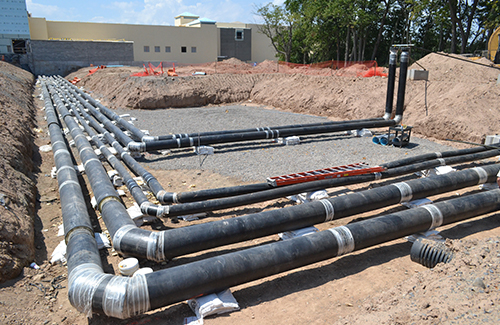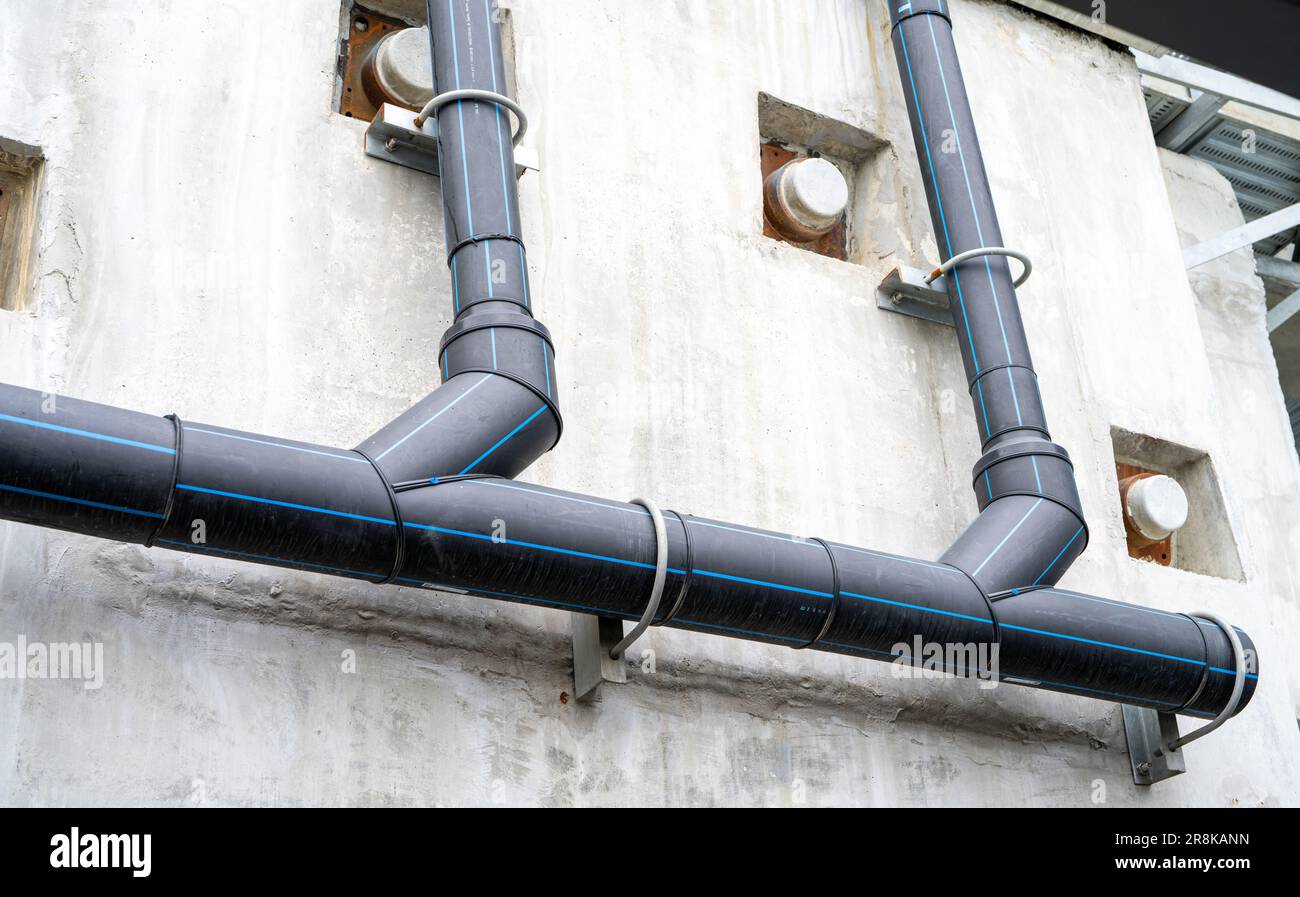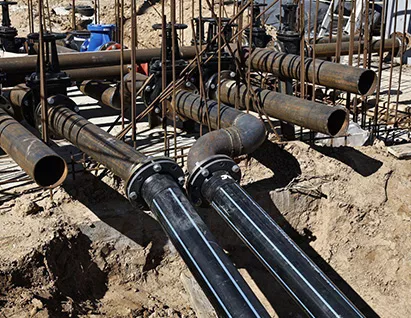Ways to partner with a Pipeline Manufacturer
Wiki Article
Discovering the Leading Pipeline Manufacturers: High Quality, Integrity, and Development
The pipeline manufacturing sector stands at the junction of innovation, high quality, and integrity, driven by leading firms such as Tenaris and Vallourec. These makers are not only devoted to generating high-performance products however are likewise pioneering lasting methods that attend to modern environmental problems (Pipeline Manufacturer). As we analyze the requirements that specify excellence in pipeline services, it becomes evident that the landscape is swiftly progressing. What particular innovations are emerging, and how are these improvements forming the future of pipeline facilities? The solutions may redefine market criteria in means that are not yet totally comprehendedLeading Manufacturers Introduction
In the domain name of pipeline manufacturing, a number of principals become leaders, each contributing considerably to the industry's landscape. Firms such as Tenaris, Vallourec, and JFE Steel have developed themselves as frontrunners by constantly delivering high-quality items that meet rigorous sector criteria. Tenaris, renowned for its ingenious remedies, focuses on seamless and bonded pipelines, catering mostly to the oil and gas market. Vallourec, a French multinational, concentrates on the manufacturing of premium tubular services, highlighting sustainability and advanced technology in its manufacturing processes.JFE Steel, a significant Japanese manufacturer, is recognized for its comprehensive range of steel pipelines, especially those made use of in energy and framework projects. Their dedication to r & d has enabled them to create high-performance products that withstand harsh ecological problems. Additionally, business like united state Steel and National Oilwell Varco have broadened their market presence by diversifying their product offerings and improving operational performances.
These leading manufacturers not just dominate the marketplace however additionally drive development within the industry, setting benchmarks for high quality and reliability that players desire achieve. Their payments are important for satisfying the boosting demand for reliable and sturdy pipeline solutions worldwide.
Standards for Quality Assessment
Quality assessment in pipeline manufacturing depends upon 2 critical standards: material resilience criteria and manufacturing process effectiveness. Guaranteeing that products fulfill extensive longevity standards is crucial for the long life and reliability of pipes. In addition, optimizing the manufacturing process can boost efficiency while keeping premium quality, eventually affecting total efficiency and safety.Material Durability Specifications
Ensuring the durability and integrity of pipeline products is important for maintaining framework honesty and operational efficiency. Material toughness criteria play an important duty in assessing the high quality of pipelines, determining the efficiency and life expectancy of the materials made use of in building. Manufacturers must abide by a series of extensive requirements, including those set by companies such as ASTM International and the American Oil Institute (API)These requirements evaluate different factors, including corrosion resistance, tensile strength, and fatigue efficiency. For circumstances, pipelines used in corrosive environments require products that can hold up against chemical deterioration, while those based on high-pressure problems should show extraordinary tensile toughness.
In addition, variables such as temperature variations and environmental problems need to be taken into consideration, as these can significantly affect product behavior over time. Manufacturers typically use sophisticated testing methodologies, consisting of accelerated aging examinations, to mimic long-lasting wear and warranty that materials go beyond or fulfill industry benchmarks.
Manufacturing Process Effectiveness
Manufacturers' capability to enhance producing process effectiveness is crucial for creating high-grade pipes that satisfy rigorous sector criteria. Performance in making straight affects price administration, manufacturing timelines, and total item stability. To achieve this, leading pipeline makers implement sophisticated strategies such as lean manufacturing, automation, and real-time information analytics.Lean manufacturing principles are crucial in reducing waste and making the most of source application. By streamlining processes and getting rid of redundancies, makers can boost performance while guaranteeing constant quality. Automation technologies, including robotics and computer numerical control (CNC) machines, play a crucial duty in enhancing precision and lowering human mistake, thus raising the integrity of the end product.
In addition, the usage of real-time information analytics enables manufacturers to keep track of production procedures constantly, allowing them to determine bottlenecks and make prompt modifications. This positive method not only enhances performance but likewise sustains quality control procedures by making sure compliance with regulative standards.
Integrity in Pipeline Solutions
Integrity in pipeline remedies is extremely important, as it straight affects the safety and efficiency of liquid transportation systems. Key elements consist of the resilience of materials made use of, adherence to rigorous testing and qualification standards, and the unification of cutting-edge material services that enhance efficiency. Comprehending these components is important for makers aiming to supply reliable pipeline infrastructure.Importance of Sturdiness
Attaining resilience in pipeline solutions is essential, as it straight impacts the lasting performance and security of facilities. Sturdy pipelines are important for decreasing upkeep expenses and lowering the chance of tragic failures. This reliability is especially crucial in sectors such as oil and gas, water, and wastewater monitoring, where the effects of pipeline failing can be severe, both economically and environmentally.The products and producing processes utilized by pipeline manufacturers play a significant duty in figuring out the longevity of the end product. Utilizing top notch raw materials, advanced modern technologies, and cutting-edge style concepts ensures that pipes can endure different stress factors, including stress changes, temperature variants, and corrosive settings.
Additionally, the longevity of pipes is carefully linked to their ability to stand up to outside elements such as dirt motion, seismic task, and chemical direct exposures. Effective corrosion protection methods, such as finishings and cathodic protection, even more enhance the longevity of pipes, securing them versus deterioration over time.
Buying resilient pipeline solutions eventually converts to boosted functional effectiveness, reduced downtime, and enhanced security, attesting the vital importance of durability in modern pipeline manufacturing.
Checking and Qualification Criteria
In the domain name of pipeline solutions, extensive testing and accreditation requirements are crucial to assure the dependability and safety and security of framework. These requirements function as criteria for assessing the efficiency and resilience of pipeline materials and systems, validating they fulfill particular governing and market demands.Examining procedures generally incorporate different approaches, consisting of stress testing, hydrostatic analyses, and non-destructive screening techniques. These evaluations are vital for recognizing possible weak points or flaws in the materials before they are deployed in real-world applications. Furthermore, accreditation by acknowledged organizations guarantees that suppliers adhere to developed guidelines, which promotes trust among stakeholders, consisting of engineers, specialists, and end-users.
Lots of top pipeline producers participate in continual tracking and improvement of their testing procedures to adjust to advancing industry standards and technical innovations. Conformity with standards such as ASTM, ASME, and ISO not only boosts product reliability yet likewise minimizes the threat of environmental occurrences related to pipeline failings.
Innovative Product Solutions
The growth of cutting-edge material options has transformed the landscape of pipeline manufacturing, enhancing both efficiency and resilience. Advanced products such as high-density polyethylene (HDPE), cross-linked polyethylene (PEX), and composite materials have actually arised as game-changers, providing premium resistance to rust, temperature level fluctuations, and stress variations. These materials not only prolong the life expectancy of pipelines but likewise decrease upkeep expenses, making sure reputable long-term performance.Manufacturers are progressively adopting wise products that incorporate sensors for real-time surveillance. This technology allows for proactive upkeep, significantly improving reliability by identifying leakages or structural weaknesses before they rise right into vital failures. The assimilation of nanotechnology has actually likewise led to the growth of finishes that enhance the toughness of pipes versus abrasion and chemical direct exposure.
Sustainability is one more essential emphasis, with manufacturers discovering bio-based composites and recyclable products that lessen environmental effect. As regulatory criteria continue to advance, the emphasis on cutting-edge material solutions becomes critical in meeting rigorous safety and security and environmental needs. Inevitably, these developments not just improve the reliability of pipeline systems but also contribute to the total performance and sustainability of power transportation frameworks.
Innovations in Pipeline Innovation
Innovations in pipeline modern technology are transforming the sector by enhancing effectiveness, security, and ecological sustainability. Recent improvements concentrate on smart pipeline systems that use sensing units and IoT modern technology to monitor conditions in actual time, allowing proactive maintenance and decreasing the threat of failures. These systems can discover leakages, stress modifications, and other abnormalities, permitting rapid feedback and lessening environmental influence.Furthermore, the development of innovative materials, such as composite and corrosion-resistant alloys, substantially expands the life-span and integrity of pipes. HDPE Pipe Supplier (American Plastics LLC HDPE Pipeline Manufacturer). These products minimize upkeep expenses and improve efficiency in harsh environments, making them ideal for water, oil, and gas transportation
Moreover, automation and robotics are playing a vital role in pipeline building and construction and inspection. Drones and robot gadgets promote studies and analyses of hard-to-reach areas, making certain thorough inspections without jeopardizing safety and security.
Innovative designs, such as modular pipeline systems, enable for higher flexibility in installment and adjustment, providing to the dynamic demands of the power industry. With each other, these technical innovations not just enhance functional performance however also add to a much more resilient and sustainable pipeline framework, leading the way for a greener future.
Instance Research Studies of Success
Throughout numerous fields, successful implementations of innovative pipeline technologies show significant improvements in functional effectiveness and security. One noteworthy instance is the implementation of clever pipeline monitoring systems in the oil and gas market, where real-time information analytics have minimized leakage detection times by over 50%. This not just decreases environmental dangers yet likewise improves the total integrity of pipeline facilities.
Furthermore, a major manufacturer executed robotic inspection modern technologies in its pipeline upkeep procedures, causing a 40% renovation in assessment effectiveness. This method has streamlined upkeep timetables and substantially minimized downtime.
These situation studies highlight how top pipeline makers are leveraging innovative innovations to foster integrity American Plastics LLC HDPE Pipeline Manufacturer and functional excellence, inevitably establishing new criteria for the market. As these successes remain to unravel, they lead the way for more improvements in pipeline manufacturing and management.

Environmental Sustainability Practices
Regularly, pipeline manufacturers are focusing on environmental sustainability techniques to reduce their ecological footprint and enhance the long life of their products. This dedication is shown in different initiatives targeted at reducing waste, conserving energy, and utilizing sustainable materials throughout the manufacturing procedure.
Numerous makers are adopting sophisticated technologies that lessen exhausts and power intake. The integration of automated systems and energy-efficient machinery helps streamline production while decreasing dependence on fossil gas. Additionally, companies are increasingly transforming to eco-friendly materials, such as recycled metals and bioplastics, which not only decrease the ecological effect but also promote a circular economy.
Pipeline producers are carrying out rigorous lifecycle assessments to review the ecological implications of their products from inception to disposal. This approach allows them to identify possibilities for enhancement and foster responsible sourcing and waste monitoring practices.
Collaboration with ecological organizations further boosts these initiatives, as producers look for to straighten their operations with global sustainability objectives. Ultimately, these ecological sustainability methods not just add to a healthier planet yet likewise position suppliers as accountable leaders in the sector, attracting environmentally mindful stakeholders and clients alike.
Future Trends in Pipeline Manufacturing
As the need for more reliable and sustainable framework expands, pipeline manufacturing is poised for substantial developments that will certainly reshape the market. Key trends prepared for in the coming years include the assimilation of advanced materials, such as composite and corrosion-resistant alloys, which boost toughness while lessening ecological effect. Manufacturers are also anticipated to take on cutting-edge production techniques, like additive manufacturing and automation, to simplify processes, lower waste, and reduced expenses.Furthermore, the surge of smart pipeline modern technologies, incorporating sensors and IoT gadgets, will certainly enable real-time monitoring and predictive maintenance, consequently boosting safety and operational performance. This electronic makeover will not just optimize resource monitoring but also facilitate compliance with strict ecological guidelines.
Sustainability will certainly continue to be a main emphasis, driving manufacturers to purchase environment-friendly techniques, consisting of energy-efficient manufacturing techniques and recycling initiatives. As the global focus on climate change magnifies, pipeline producers will require to adjust by establishing remedies that satisfy both environmental and financial needs.
Often Asked Concerns

What Industries Primarily Make Use Of Pipeline Products From These Manufacturers?
Pipeline products are largely utilized in sectors such as oil and water, wastewater and gas management, chemical handling, mining, and building. These markets rely upon effective, durable, and risk-free transport of fluids and products.
How Do Manufacturers Ensure Conformity With International Pipeline Standards?
Manufacturers ensure compliance with worldwide pipeline standards by applying extensive quality assurance procedures, carrying out routine inspections, adhering to well established governing structures, and purchasing worker training to advertise recognition and understanding of safety and quality demands.What Is the Ordinary Life Expectancy of Pipelines From Leading Manufacturers?
The ordinary life expectancy of pipelines from leading producers normally ranges from 30 to 100 years, depending upon product, environmental conditions, and upkeep practices. HDPE Pipe Manufacturing Texas. Routine examinations and adherence to market standards significantly influence durability and efficiencyExist Certifications Specific to Pipeline Production Top Quality?
Yes, different qualifications exist for pipeline making top quality, including ISO 9001 for quality management systems and API criteria certain to pipelines. These qualifications guarantee adherence to rigorous safety and security, performance, and ecological standards within the sector.Exactly How Do Manufacturers Deal With Pipeline Maintenance and Fixes?
Manufacturers typically carry out a proactive upkeep method that includes normal inspections, monitoring systems for very early discovery of concerns, and an organized repair service protocol. This strategy assurances pipeline integrity, decreases downtime, and improves overall functional efficiency.Quality analysis in pipeline manufacturing pivots on two essential requirements: product toughness standards and making process performance - Pipeline Manufacturer. Product resilience criteria play an essential duty in assessing the top quality of pipelines, determining the efficiency and life expectancy of the materials utilized in construction. The materials and making processes utilized by pipeline suppliers play a significant role in identifying the longevity of the final item. The average lifespan of pipelines from leading makers typically ranges from 30 to 100 years, depending on material, environmental problems, and upkeep methods. Yes, numerous certifications exist for pipeline manufacturing top quality, including ISO 9001 for top quality administration systems and API requirements certain to pipelines
Report this wiki page